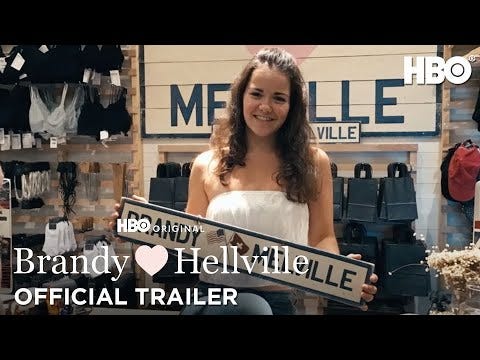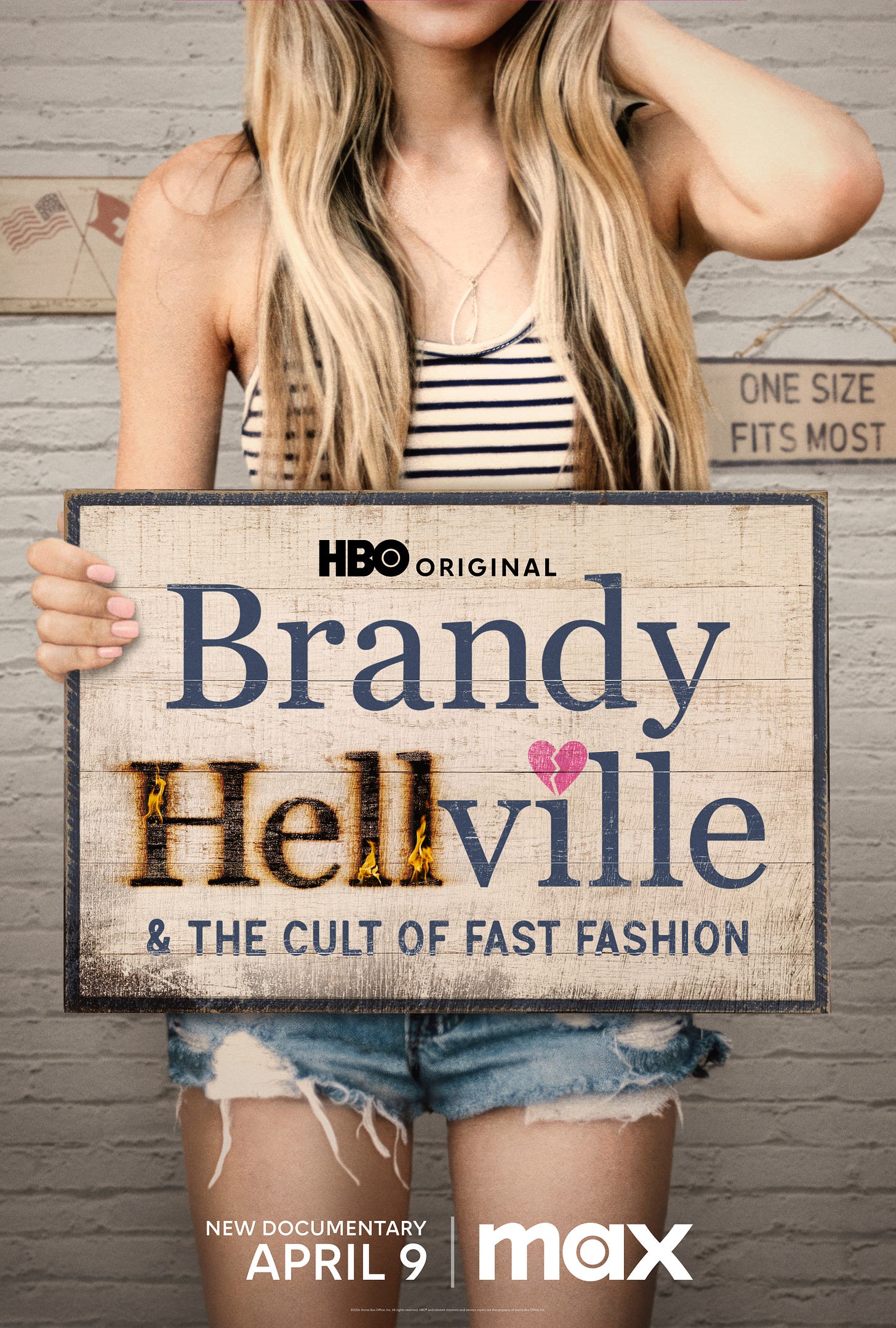See You on HBO? Interview With Director Eva Orner
Brandy Hellville and the Cult of Fast Fashion premieres on HBO (and I'm in it!)
In February 2024, I decided to give THIS STUFF a little break. After two and a half years of writing this newsletter discussing labor and sustainability in fashion, I began to feel like I was writing in circles, and frankly, I wasn’t sure if it meant anything. In my work, I've always wanted to bridge the gap between people who want to consume fashion and those who love it but are begging for that cycle to slow down. In order to continue to do that, I needed to take a step back (while I focused on contributing editor work at Teen Vogue, working on another book, and reporting stories about sustainable fashion outside of the United States - more on that soon).
But now I’m back with a very special newsletter. About a year ago, director Eva Orner reached out to me about her new project, Brandy Hellville and the Cult of Fast Fashion. It’s a documentary based on an exposé written by Kate Taylor for Business Insider. While she highlights the behavior of a fast fashion founder, much of which the film goes over through the stories of those most impacted, she also wanted to bring attention to the toxic culture of fast fashion generally. Problematic behavior is rampant throughout fashion and is partly brushed aside in favor of constant consumption. It’s no more evident than in brands that don’t shy away from controversy but instead continue on knowing that they’ve tapped into a cycle that has no signs of slowing down.
Ahead, Eva and I spoke about film, fast fashion, and what we hope for the future of fast fashion.
Alyssa Hardy: Congrats! It's kind of nuts how much it's taken off on social media, so that's cool.
Eva Orner: [The preview has] like two million views on TikTok!
Alyssa: I was looking through the comments and just trying to get a sense of what people were talking about. One question was, ‘Why Brandy?’ So my question to you is just that: why use Brandy Melville to talk about fast fashion?
Eva: I wanted to do something about fast fashion for a long time. And it started seven or eight years ago. I started buying what I thought was sustainable fashion because I knew there was a problem. I knew the exploitation of workers, I knew environmental disasters, and I thought I'd just buy sustainably. So I was buying all these brands that said they were sustainable, but when you went to their website, there was no information. And I always use the word opaque with fashion. The fashion industry is like a brick wall. There's no transparency. I started doing research, and I came across greenwashing and the fact that there's no regulation, and it's pretty easy to say you're sustainable. It doesn't really mean anything.
I was looking for a story, and I met the producers who were fantastic. I told them I was looking for a story about fast fashion, and they came back with a Brandy story, but I didn't know what Brandy was. I'm not a teenage girl; I don't have a teenage daughter. I live in LA, but I didn't know it. So I did a deep dive, and I came obviously across Kate Taylor's article for Business Insider, and I thought, okay, this is an exposé, a good exposé, and it really had very little impact on the company and this cult-like love that young girls have the company. And I thought that was interesting.
Alyssa: For sure.
Eva: Obviously, I wanted to build it up to something more. What's interesting about Brandy is a lot of companies get busted for doing one bad thing, whether it's exploiting a sweatshop and lying about it or having some racist behavior. But Brandy has everything, and yet still, it has this worship of young girls. They really rode the wave of social media. It started with Tumblr, went into Instagram, and now it's TikTok. And I don't think it was by design. I think they got lucky, but there was something about this company that really rode the social media wave, and it benefited them. There are a lot of companies doing bad things, but I think there's something about being exposed for being a terrible company, and it has no impact and what that says about us as well.
Alyssa: I think something that often goes missing is this idea that you can have the bad companies that treat their retail workers poorly and exploit young girls, but it's also throughout their supply chain - which is ignored. And this film connects those in a way that is not typical. You're either seeing one side or the other. So it's really very smart to do that. I'm wondering if you can talk a little bit about the industry piece of it. It's so insidious on every side, and everybody can get away with it because the mechanisms of the fashion industry really allow bad behavior.
Eva: Ayesha [Barenblatt], who is in the film, runs this organization called Remake. She says that there are good and bad companies everywhere. You can find good companies in China and bad companies in LA or anywhere. There's something about Brandy that I just keep coming back to. And this is almost like a question to you a little bit about the appeal of it. You grew up in that era, you worked at Teen Vogue in this era, and I can't really put my finger on what it is about Brandy that is so enduring, and new generations keep coming up and keep falling in love. And that's always been a bit of a question to me. You are the fashion expert; what do you put it down to?
Alyssa: I think that there's an aspirational piece of it that is not super healthy. While they're being extremely not inclusive by doing one size fits all, they kind of play into that really toxic, aspirational piece that fashion does really well. Also, it’s just easy basic styling that's really cheap.
That actually leads me to something else I want to ask you. I'm so curious about impact, and I find this in my reporting, and I'm sure just generally as a documentarian. What do you hope this does? Does it do things in your past experience with documentaries?
Eva: Yeah, documentaries sometimes make policy changes or change many people's attitudes. I mean, I always come into it really realistically: if you change one person's mind, you've succeeded. But obviously, we've already reached potentially over 3 million people with just the trailer of this film. When all your ideas really kind of galvanize after you've made a film, the power is not in the companies. The power is in the consumer. The consumers of a lot of the fashion industry are really young girls and young women. They could change the global fashion industry; they could really change things. If 30% of people who buy regularly at Brandy stopped doing it, that would have a massive impact. What about if it was 80%? I feel hopeful. I feel like if young girls and women stopped making content on social media unwittingly advertising for multinational companies who are laughing all the way to the bank, and they started making videos talking about how bad the fashion industry is or bad experiences they had or that then all alternatives to going shopping or how they're not buying anything for six months new. I mean, that would be a total wave of change. I don't know how realistic it is, but wouldn't that be amazing if the whole of social media turned around led by this?
Alyssa: For sure. Poetic justice.
Eva: I think we should talk about it and try to encourage people to do that. I'm getting inundated with people now contacting me and asking if they can be in the film, asking to tell their stories. And I'm like, everyone should be telling their stories on social media so it doesn't just end with film and these 10 or 15 young women, it should be this wave of people telling their stories. Wouldn't that be amazing?
Alyssa: Of course! Even just seeing some of the people in the film posting and being so proud of taking a stand is really amazing. Because it is scary.
Eva: It's so scary. But once you do it, you feel amazing. Look at the pattern and look at the young women in the film, who the young girls who shop there used to look up to. There's always going to be people who say, I love their baby tees but everyone has to make choices in their life about the decisions they make and how they want to live. And I think we should just be hopeful that people are going to make better choices.
Alyssa: I wanted to speak a little bit about the waste piece in the film.
Eva: You've been to Ghana since we filmed.
Alyssa: Yes, what a life-changing experience. Truly. I mean, I wish I had had the chance to go before, but I'm so happy I went now. Seeing it all on film together, I felt like this could have been a 10-part series. There's just so much, and you distilled it really well. But I was wondering if there was anything about the waste piece of it that you truly hope comes through?
Eva: If you made a 10-part documentary about fast fashion that spoke about the issues in a very dry and serious way, people wouldn't watch it. If you tell the story of Brandy, you've got a massive audience. And then, if you can slide in some environmental devastation stories that directly result from your buying, that can have an impact. I think hopefully what works about this story is it's not just Brandy Melville; it's when you buy this on Instagram, and it comes to you, you get it tomorrow, and it's super cheap, and you don’t know anything about where it's made, and you wear it once, and then you donate it, and it probably ends up on a beach in Ghana. Maybe that will make you think. I feel like you can't unsee those images when you see them. They are shocking. Most people don't know about it, and we are directly responsible.
Brandy Hellville and The Cult of Fast Fashion is now on HBO. Watch the trailer below:




